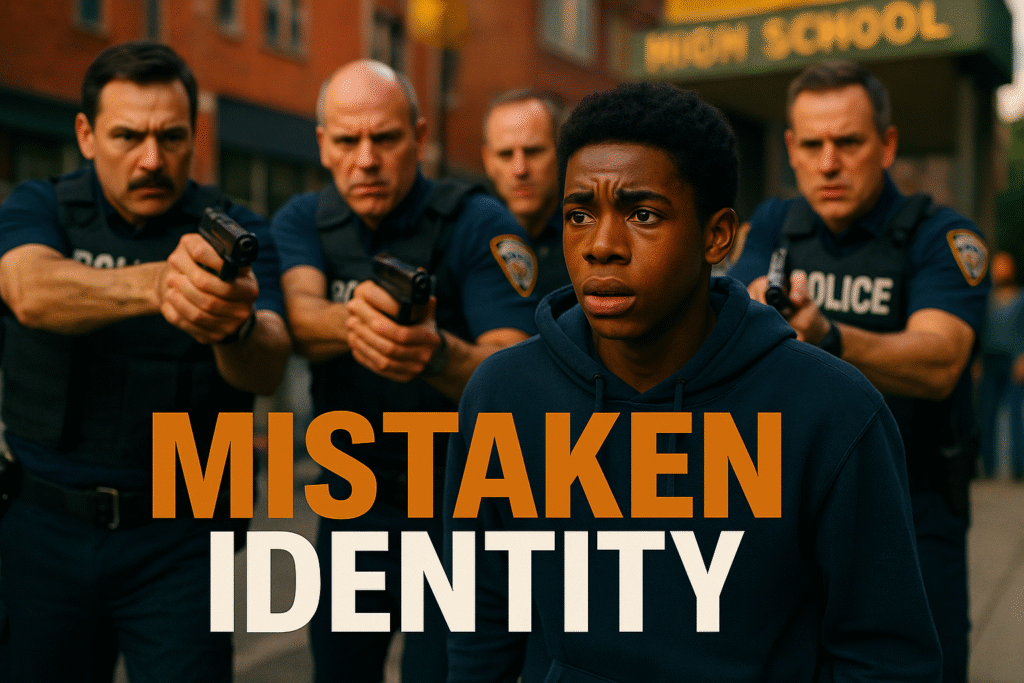

When Mistaken Identity Turns Dangerous
By Darius Spearman (africanelements)
Support African Elements at patreon.com/africanelements and hear recent news in a single playlist. Additionally, you can gain early access to ad-free video content.
Police Detain Black Teen
On May 13, 2025, a frightening incident unfolded in South Portland, Maine, involving local police and officers from the Portland Police Department. During his lunch break, a 16-year-old Black high school student found himself detained at gunpoint. Officers believed he matched the description of a 19-year-old Black male wanted on burglary charges (atlantablackstar.com). This alarming event occurred around 11 a.m. near Deering High School, just a block from where police intended to serve a warrant for Miles Hibbard, the 19-year-old suspect (atlantablackstar.com).
The student was a passenger in a blue car. An officer spotted him as he stepped out and began walking on the sidewalk (atlantablackstar.com). Officers, some armed with long guns and wearing bulletproof vests, quickly surrounded the teen. They ordered him to put his hands up, walk backward, lie on his stomach, and then handcuffed him (atlantablackstar.com). The student repeatedly asked, “What'd I do?” while complying with their orders (atlantablackstar.com). This incident highlights the immediate and often terrifying impact of mistaken identity on young Black individuals.
Racial Profiling Concerns
Amber Miller, the mother of the detained teen, firmly believes the incident was a clear case of racial profiling. She stated that her son did not resemble the suspect, Miles Hibbard, beyond their shared skin color (atlantablackstar.com). Miller pointed out that the suspect had a sleeve tattoo, which her son did not, and her son was wearing a T-shirt, making any such tattoo visible if he had one (atlantablackstar.com). This crucial detail, seemingly overlooked by officers, raises serious questions about the thoroughness of their identification process.
Miller also expressed deep concern about racial bias within the police department's decision-making, especially since all officers at the scene were white (atlantablackstar.com). She referred to the incident as “Walking While Black,” a term used to describe racial profiling (atlantablackstar.com). “Walking While Black” refers to the disproportionate targeting and scrutiny of Black individuals by law enforcement, often based on racial bias rather than specific suspicious behavior. This can lead to stops, detentions, and arrests for activities that would not draw attention if engaged in by individuals of other racial backgrounds. A study revealed racial disparities in South Portland arrests, indicating that Black individuals may be arrested at a higher rate than their representation in the population would suggest (pressherald.com). This study, voluntarily conducted by the police department, highlights that disparities can occur without discrimination but still raises the question of “why?” (pressherald.com).
Understanding “Walking While Black”

“Walking While Black”: This term describes the disproportionate targeting and scrutiny of Black individuals by law enforcement, often based on racial bias rather than specific suspicious behavior. It highlights systemic bias in policing and can lead to stops, detentions, and arrests for activities that would not draw attention if engaged in by individuals of other racial backgrounds.
Police Defend Actions
South Portland Police Chief Daniel Ahern defended his officers' actions, stating they acted appropriately given the information they had at the time (atlantablackstar.com). In a letter to South Portland City Manager Scott Morelli dated May 19, six days after the incident, Chief Ahern stated he was “proud of the way our officers handled the student” (atlantablackstar.com). He asserted that no policies were violated and officers acted in accordance with best practices (atlantablackstar.com). Ahern initially described the situation as an “unfortunate circumstance” where the student “matched the description” of the subject of the warrant (atlantablackstar.com).
When executing a search and arrest warrant, especially for a burglary suspect, law enforcement protocols often involve a heightened level of caution, including the potential for SWAT team involvement and officers drawing their weapons (southportland.gov). This is typically done to ensure officer safety and to control a potentially dangerous situation, particularly if there is a belief that the suspect may be armed or resist arrest. The specific procedures can vary by department and the perceived threat level. The parents of the mistakenly detained teen stated that officers had “guns pointed at him,” suggesting that drawing weapons is part of the procedure when officers perceive a threat during warrant service, even if mistaken (wgme.com).
Withholding Footage Raises Questions
Body camera and dash camera footage of the incident were withheld for almost five months before being released by the South Portland police (atlantablackstar.com). Police initially claimed that releasing the footage would interfere with “criminal law enforcement proceedings” and a “juvenile intelligence investigation” (atlantablackstar.com). The released footage shows the student asking “What'd I do?” multiple times while complying with officers' orders (atlantablackstar.com). The student's face is blurred in the released videos, and his name has not been publicized (atlantablackstar.com).
The boy's mother believes there are additional videos that have not been released. She stated that the provided footage does not show the interaction in its entirety or all officers present (atlantablackstar.com). The delay in releasing body camera and dash camera footage can be attributed to various factors, including ongoing investigations, legal reviews, and departmental policies regarding public disclosure. While specific reasons for the delay in this case are not detailed, such withholding can significantly impact public trust and perceptions of transparency, as it may suggest an attempt to control the narrative or obscure details (wgme.com).
Footage Release Timeline
Incident occurs: 16-year-old detained at gunpoint.
Chief Ahern defends officers' actions in letter.
Footage released after almost five months.
The Actual Suspect
The actual suspect, Miles Hibbard, was arrested later the same day at his job in Cape Elizabeth (atlantablackstar.com). The warrant for Hibbard was for burglary charges, specifically for stolen cologne and shoes (atlantablackstar.com). The parents of the mistakenly detained teen were furious because the officers did not “do their homework” and were aware that the actual suspect had a “large, very distinct tattoo down his arm,” a detail that was apparently not considered during the detention of their son (wgme.com).
The importance of distinctive features like tattoos in tracking down criminals is acknowledged, suggesting that such details should be documented and utilized in identification processes (reddit.com). The failure to account for this detail during the detention of the teen, who did not have such a tattoo, is a central point of contention raised by the teen's parents. This indicates that while such identifiers were known, they were seemingly not adequately utilized or verified during the identification process.
Legal Action and Due Diligence
The incident has led to public scrutiny and potential legal action (atlantablackstar.com). Amber Miller, the boy's mother and an attorney in Portland, is considering taking legal action against the police (atlantablackstar.com). Miller stated that the police “failed to do any meaningful due diligence” and created an “incredibly unsafe situation for innocent students” (atlantablackstar.com). “Due diligence” in a policing context typically refers to the reasonable steps officers should take to verify information and ensure the accuracy of their actions, especially when detaining individuals.
This would include thoroughly checking suspect descriptions, considering all available identifying features, and not relying solely on broad characteristics. Individuals detained under mistaken identity generally have rights against unlawful arrest and may have grounds for legal action if their rights are violated due to negligence or lack of due diligence by law enforcement. The article mentions “potential legal action” by the family of the mistakenly detained teen (wgme.com). However, the search results do not explicitly state whether Amber Miller or her family have formally filed any legal complaints or lawsuits.
Ongoing Police Activity and Reviews
Recent news from the South Portland Police Department indicates ongoing police activity and investigations. On May 13, 2025, at approximately 11:30 AM, South Portland Police Officers responded to the area of Orkney St. in Portland to execute an arrest and search warrant for a burglary suspect (southportland.gov). This aligns with the timing and nature of the incident described. On April 14, 2025, South Portland Police Department detectives were made aware of a robbery that occurred on April 11 at a private residence within the city, leading to juveniles being charged (southportland.gov).
The South Portland Police Department launched a policy review following the incident (wgme.com). However, without details on the scope, specific findings, or any subsequent policy changes or implementations, it is difficult to assess the department's commitment to institutional accountability and preventing similar incidents in the future. Transparency regarding such reviews is crucial for public trust. A 2023 study on racial disparities in South Portland arrests recommended that the police department “continue anti-bias training” and “step up community-based policing in neighborhoods of color” (pressherald.com).
Recommendations for Police Training
- Continue Anti-Bias Training: Ongoing education to address and mitigate racial bias in policing.
- Step Up Community-Based Policing: Increase engagement and trust-building efforts in neighborhoods of color.
- Review Identification Procedures: Enhance protocols for verifying suspect descriptions, especially when relying on broad characteristics.
- Improve De-escalation Techniques: Provide training on de-escalation in scenarios involving mistaken identity to prevent unnecessary force.
Community Response and Broader Context
The incident, particularly given the allegations of mistaken identity and racial profiling, likely generated significant community concern and discussion. The parents' public outrage, as reported by the news, suggests a strong negative community reaction to the mistaken detention (wgme.com). Understanding the community's reaction, the involvement of local advocacy groups, and how the incident fits into broader social justice conversations would provide a more complete picture of its significance.
Other recent police-related news in Maine includes postponements of community events due to ongoing investigations. The Biddeford Police Department postponed its National Night Out event due to an ongoing investigation, stating they were unable to provide details but would update the community (wgme.com). This postponement was later linked to the arrest of Emil Girard, wanted for two separate shootings in Biddeford. Police stated the decision was made out of an abundance of caution to allow officers to focus resources on the investigation (wmtw.com). These events underscore the ongoing challenges and complexities faced by law enforcement agencies and the communities they serve.
Impact on the Student and Future Steps
The search results do not provide specific details about the emotional, psychological, or social impact on the 16-year-old student beyond the immediate distress described by his parents. Nor do they mention if any support or counseling has been offered. The parents' fury and the public nature of the incident suggest that the experience was traumatic. The South Portland Police Department launched a policy review after the incident, which would likely include an examination of existing training and potential areas for improvement (wgme.com).
The incident highlights the critical need for law enforcement agencies to continuously review and refine their procedures, especially concerning suspect identification and de-escalation techniques. It also underscores the importance of transparency and accountability in maintaining public trust, particularly within communities of color. The ongoing dialogue and potential legal actions stemming from this event will undoubtedly shape future policing practices in South Portland and beyond.
ABOUT THE AUTHOR
Darius Spearman has been a professor of Black Studies at San Diego City College since 2007. He is the author of several books, including Between The Color Lines: A History of African Americans on the California Frontier Through 1890. You can visit Darius online at africanelements.org.
